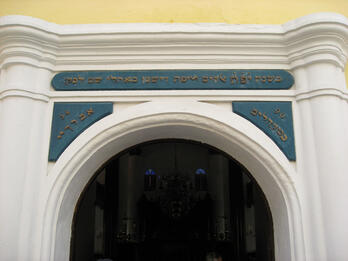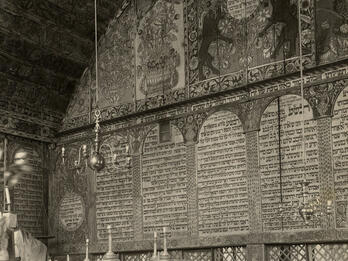Takkanot (Regulations)
Rules Whereby We May Enjoy a Privileged Status in Reggio
Since D. Bendito has done us the favor of prevailing upon his highness, the Duke of Modena, to allow us into his state with such love and grace and knowing that the heart of the princess is under his control, we have the added obligation to recognize this heavenly favor by showing our great gratitude to his Divine Majesty by seeking out and exhorting each other to engage in His service, dedicating hours beyond those of the prayer services to study and learn how we may please Him and live in such a way as not to offend anyone but rather to seek to be of service to all—may His Holy Name be glorified, He who has chosen us for His people—by shunning anything that may bring us into disrepute.
We who enjoy privileges in Reggio that His Highness has granted us and do not pay the same taxes as the local Jews shall observe the following rules:
The Sunday preceding Rosh Hashanah, all members of the Jewish community who are more than twenty years old or are married without having attained that age shall gather and elect by ballots and ballot box a council of seven persons who shall not be related to one another to the degree that they cannot testify against each other according to prevailing practice and they shall govern the following year and, if anyone fail to participate in the election of this governing body, the election shall be valid if the majority of the community members participate in the vote. And if fewer than fifty members participate in the vote, only three persons shall be elected to the governing council.
The following year, no more than three of those who have served in the preceding year can be elected, even if he receives more votes than someone else who has not served.
No one who has served two years in a row without a year’s abstention shall have a ballot cast in his favor.
If, on the first round of voting, there shall not be seven who have more than half the votes balloted, a second round shall be held in which the person with the most votes shall be elected and should the same number of votes be cast for each candidate, the oldest one in all the balloting shall be elected.
The seven elected governors shall vote among themselves for three to be president each month in rotation so that each shall serve four months during their year. And of the others, they shall elect one to be keeper of the written documents and to write down what occurs; another to be the beadle collecting 4 percent of what is bought; another to be the beadle in charge of collecting 4 percent of whatever is sold and 1 percent for upkeep, which he shall seek to collect each Rosh Ḥodesh [the beginning of every month], more or less to adjust the bill at the end of the year; and another shall be in charge of the community property.
All council members shall be obligated to convene at least one day each week to deal with anything they deem in the common interest and whatever they mandate by majority ballot shall be firm and certain. All monetary transactions require at least a five-vote majority to disburse funds already collected and a six-vote majority to disburse funds estimated to be collected that year—and for this each one shall put in his one-seventh share until the funds are collected.
On this and on every occasion for which they are not in accord, and three of the council members deem it appropriate to convene the community, they shall do so and each one may state his views and a majority vote shall determine that which must be complied with.
Whenever the council convenes and it is necessary to take a vote, if not all council members are in attendance, they shall call upon the oldest members of the preceding council who are not invalidated by the others taking part in the vote nor have a personal interest in the issue at hand.
When the three presidents know that a dispute has arisen, they shall convene on Monday and Thursday after prayers to hear the case, and if any of them cannot attend the meeting, they shall summon the oldest council member who can join them so that they will be three in number.
The said three presidents shall be judges in all disputes between community members up to the sum of ten ducats and if the amount be greater, they shall make the litigants take judges and limit their time to reach a verdict. And the beadle in charge of collecting the 4 percent and the upkeep of the building shall be charged with carrying out the verdicts under the authorization of our illustrious judge, according to the privilege granted by his serene Highness.
Should the litigants, being members of the community, refuse to take judges in cases involving more than ten ducats, the presidents shall serve as judges; however, in such cases, an appeal may be made to the entire council, which, with four ballots, even if the said ballots contain the votes of the first three presidents, shall render the verdict as definitive.
The president who serves his month shall be charged with calling people to the Torah and assigning the person to lift the Torah scroll. On holidays or fair days, if one of the presidents feels that a council vote should be taken, it shall take place.
Credits
Published in: The Posen Library of Jewish Culture and Civilization, vol. 5.




